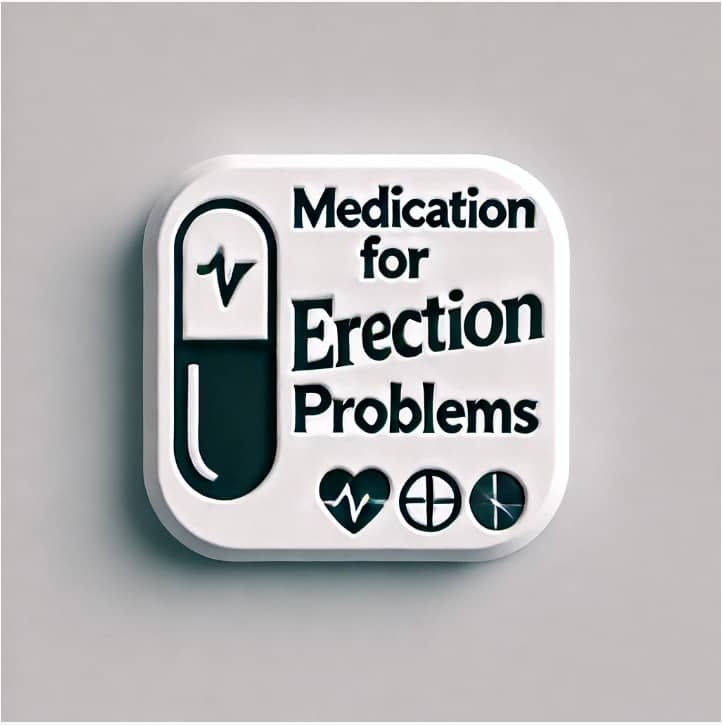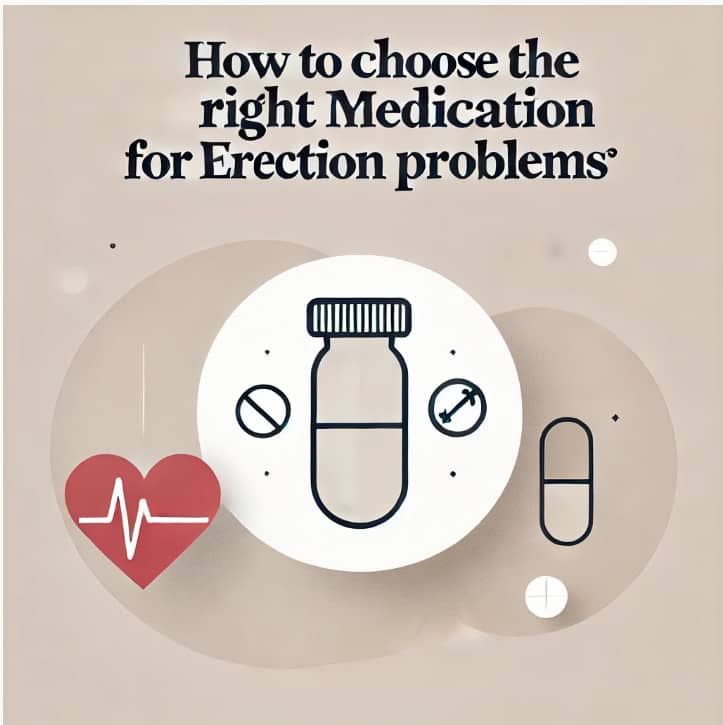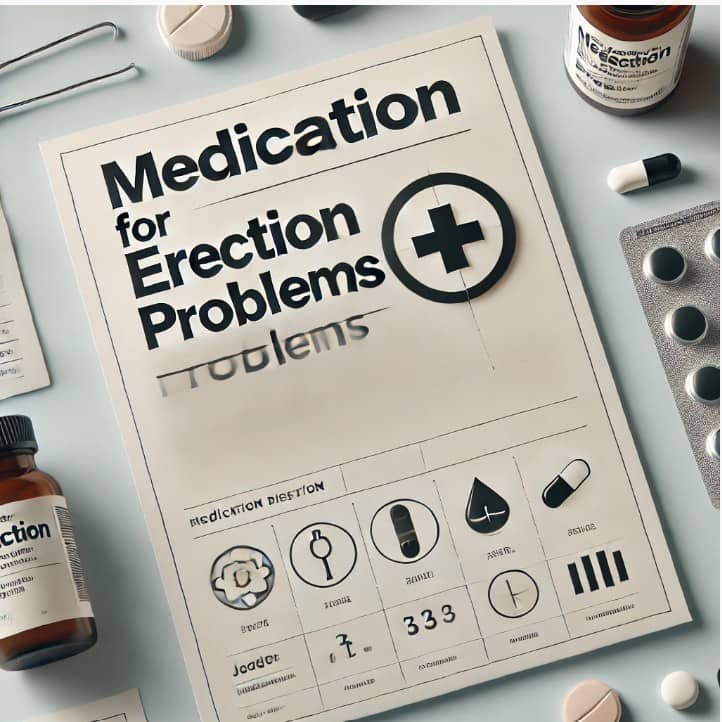
Erectile dysfunction (ED) is a condition that affects millions of men worldwide, causing frustration, anxiety, and relationship stress. Fortunately, there are various medications for erection problems that can help restore sexual function. However, with so many options available, choosing the right treatment can be overwhelming. This guide will walk you through the process of understanding how to choose the right medication for erection problems, ensuring that you make an informed decision that aligns with your health, lifestyle, and needs.
In this article, we’ll explore what erection problems are, how medications work, and the factors to consider when selecting the best treatment option. We will also discuss popular medications for erection problems, their potential side effects, and offer expert advice on how to make the right choice for your individual circumstances.
What Are Erection Problems?
Before delving into medications for erection problems, it’s essential to understand what causes ED. Erection problems, also known as erectile dysfunction, are defined as the inability to achieve or maintain an erection sufficient for sexual intercourse. ED can affect men of all ages, though it becomes more common as men age.
Causes of Erection Problems
There are several potential causes of ED, including both physical and psychological factors. Identifying the underlying cause of your erection problems is crucial in selecting the appropriate treatment.
Physical Causes
- Cardiovascular issues: Conditions like heart disease and high blood pressure can interfere with blood flow, making it difficult to achieve an erection.
- Diabetes: High blood sugar levels can damage nerves and blood vessels, reducing blood flow to the penis.
- Obesity: Excess weight can lead to hormonal imbalances and decreased blood flow, contributing to ED.
- Hormonal imbalances: Low testosterone levels or thyroid disorders can affect sexual function.
- Medications: Some drugs used to treat high blood pressure, depression, or prostate issues may lead to ED as a side effect.
Psychological Causes
- Stress: Anxiety, work pressure, or personal concerns can affect sexual performance.
- Depression: Low mood and lack of interest in sex can lead to erectile issues.
- Relationship problems: Issues in a relationship, such as communication difficulties or unresolved conflicts, may cause or worsen ED.
Common Medications for Erection Problems
If you’re dealing with erection problems, medications can help restore sexual function. The most common treatments for ED are PDE5 inhibitors, which increase blood flow to the penis. These medications are typically taken orally and have been proven effective for most men with ED.
Prescription Medications for Erection Problems
Viagra (Sildenafil)
Viagra is the most well-known medication for ED. It works by blocking the PDE5 enzyme, which restricts blood flow to the penis. By inhibiting PDE5, Viagra allows blood vessels in the penis to relax and expand, improving blood flow and enabling an erection. Viagra is typically taken about 30 minutes to 1 hour before sexual activity and lasts for around 4 hours.
Cialis (Tadalafil)
Cialis is another popular option. Known as the “weekend pill” due to its long-lasting effects, Cialis can remain effective for up to 36 hours. This extended duration makes it a convenient choice for men who prefer more spontaneity in their sexual activity. Like Viagra, Cialis works by inhibiting PDE5, allowing for increased blood flow to the penis.
Levitra (Vardenafil)
Levitra is similar to Viagra but may be more effective for some men. It works in about 30 minutes and lasts for up to 5 hours. Levitra is particularly useful for men who don’t respond well to Viagra. It’s an excellent option for men who prefer a faster-acting medication but still need flexibility in timing.
Stendra (Avanafil)
A newer medication, Stendra, is known for its quick onset of action—usually within 15 minutes—and its short duration of effect. Stendra works similarly to Viagra and Cialis by increasing blood flow to the penis, but it is faster-acting, making it ideal for spontaneous sexual encounters.
Over-the-Counter (OTC) Medications for Erection Problems
In addition to prescription medications, there are some over-the-counter supplements marketed as alternatives to prescription drugs. These include herbal remedies and dietary supplements that claim to improve erectile function. However, OTC medications for erection problems should be approached with caution, as their effectiveness and safety are not always well-documented. Always consult with your doctor before trying any over-the-counter product.
How Do Medications for Erection Problems Work?
Medications for erection problems generally work by enhancing blood flow to the penis. Most of these treatments belong to a class of drugs known as PDE5 inhibitors, which relax the smooth muscles of the blood vessels, allowing more blood to flow into the penis during sexual arousal.
These medications do not work without sexual stimulation, meaning they only help achieve and sustain an erection when you are aroused. It’s important to note that medications for erection problems do not cure ED but rather treat the symptoms by temporarily improving blood flow.
How to Choose the Right Medication for Erection Problems
Choosing the right medication for erection problems depends on several factors, including your medical history, lifestyle, and preferences. While PDE5 inhibitors are effective for many men, some individuals may need different treatments based on their unique circumstances. Here are the key factors to consider when choosing the right medication for erection problems:
1. Medical History and Current Health Conditions

Your overall health and any underlying medical conditions should guide your choice of medication. For example, if you have a history of heart disease or low blood pressure, certain erection medications may be unsuitable.
Viagra, Cialis, and Levitra are generally safe for most men, but they may interact with other medications, such as nitrates used for chest pain.
Always discuss your medical history with your healthcare provider to determine the best medication for you.
2. Lifestyle and Personal Preferences
Consider your lifestyle when selecting an erection medication. If you want a medication that allows for flexibility and spontaneity, Cialis might be a better choice due to its long-lasting effects. If you prefer a medication that works faster, Viagra or Levitra may suit your needs better. Understanding your preferences and how often you anticipate needing medication will help guide your decision.
3. Side Effects and Tolerability
All medications come with potential side effects, and these can vary between individuals. Common side effects of erection medications include headaches, flushing, nasal congestion, and dizziness. If you experience any discomfort or intolerable side effects, talk to your doctor about trying a different medication or adjusting the dosage.
4. Cost and Accessibility
The cost of erection medications can vary significantly. Generic versions of Viagra and Cialis are available at a lower price, and some insurance plans may cover the cost. Consider your budget and whether you can afford the long-term use of prescription medication when making your decision.
Possible Side Effects of Medications for Erection Problems
While erection medications are generally safe, they can cause side effects, particularly if taken incorrectly or in excessive amounts. Common side effects include:
- Headaches
- Flushing
- Nasal congestion
- Indigestion
More severe side effects, though rare, include:
- Priapism (an erection lasting more than 4 hours)
- Sudden vision loss or hearing problems
If you experience any of these severe side effects, seek medical attention immediately.
Interactions and Contraindications
It’s crucial to be aware of potential drug interactions when taking medications for erection problems. For instance:
- Nitrates for chest pain or heart conditions can cause a dangerous drop in blood pressure when combined with erection medications.
- Alpha-blockers (used for high blood pressure or prostate issues) can interact with medications like Viagra and Cialis, leading to low blood pressure.
Always inform your healthcare provider about any other medications or supplements you are taking to avoid dangerous interactions.
When to Seek Medical Advice
While medications for erection problems are generally safe and effective, you should consult a healthcare provider if:
- You experience persistent side effects or an adverse reaction to a medication.
- The medication does not work after multiple attempts, or you have concerns about its effectiveness.
- You experience painful erections or prolonged erections (more than 4 hours), as this could lead to permanent damage.

Regular check-ups and open communication with your doctor are essential to managing erectile dysfunction and ensuring that you receive the most effective treatment.
Medication for erection problems can significantly improve quality of life for men experiencing erectile dysfunction. By understanding how these medications work, how to choose the right one, and the potential side effects and interactions, you can make an informed decision. Always consult a healthcare provider to find the best treatment plan tailored to your needs and health conditions.
Choosing the right medication for erection problems is a personal decision that requires careful consideration of your health, lifestyle, and preferences. Whether you opt for Viagra, Cialis, or another option, the most important thing is to follow your doctor’s guidance and ensure the treatment is both safe and effective for you.
